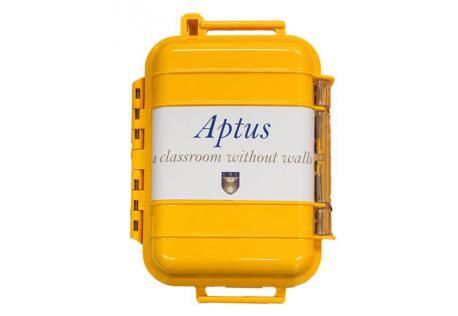
How can an elementary class of children in a small school on an atoll in the Maldives access quality textbooks? Can the bush people in Kabale district of Uganda be reached for training in bee-keeping? What devices will be needed to train teachers in the Cook Islands?
We, at the Commonwealth of Learning, believe that it is possible to reach the unreached through the use of appropriate and affordable technologies. “Aptus” or the “Classroom Without Walls“ is an exciting innovation that can transform the teaching-learning experience even under a tree in a remote resource-poor location. What does this mean?
Context
We find that simple ideas can often lead to great impact. The Grameen Bank started with a small loan of US$27 to support needy village women. Micro-credit is a global movement today. A more recent and widespread engineering innovation is the USB. As of January 2014, it is estimated that there are six billion USB connectors in use globally; whereas in 2000, this was a little-known and little-used device. What gives rise to the mass adoption of such new technologies or simple social ideas? Where is the tipping point? One, the pressing need; two, simplicity and three, freedom to replicate.
Millions of learners are still in situations where reliable and consistent access to grid power or to the Internet remains a challenge. Wholly PC-based efforts or reliance on high technology to introduce digital learning cannot spread fast enough to meet the needs of learners in resource-poor contexts. We need alternatives rather than wait for improvements in relevant infrastructure. How can technology help us achieve the tipping point?
Technology
Let us optimise the two key opportunities: availability and affordability.
Availability
Over the last 18 months, prices of unbranded Tablets have come down to US$50-75, while the computing power and memory have increased by 200%. Many countries have launched Tablet distribution projects on a mass scale, such as Akash in India; mass distribution of low cost laptops in the state of Uttar Pradesh, India; Prathom1 in Thailand; the Presidential Laptop Distribution Project in Kenya.
Affordability
The mini-PC, a new type of device, comes at the affordable price of US$ 60-70. Most have the same computing power as an entry level server of five years ago, when the cost on average, exceeded US$2,000. The increased availability of affordable solar chargers supports the use of these devices. This is an extremely important development.
Idea
We can combine these two opportunities to create functional alternatives which can overcome the challenges of lack of access to grid power or the internet. This can help us to launch an unlimited number of connected classrooms, even in isolated locations. Which means that learners in remote areas can access online services like Wikipedia, Khan Academy or choose from an infinite range of free materials.
We can re-purpose a mini-PC to act as a server to create and support a WiFi networked class. This mini-PC requires only battery power, which can be provided by the solar charger. Together these two devices cost just under US$100 and form the core of what COL calls, “Aptus” or the “Classroom Without Walls“.
As more governments begin to distribute low-cost tablets to their citizens, Aptus makes it possible to link learners in remote areas to experience the power and advantages of connected learning. Aptus can run a Learning Management System such as Moodle through which learners can access materials using hand-held tablets. It is possible for a school administration to add new materials to Aptus, that are relevant to the milieu and context.
Content
Aptus contains about 2,000 videos from the Khan Academy and 6,000 articles and 50,000 images from the Wikipedia for schools (selected by the SOS Children). It also contains several open textbooks on different school subjects. All this content is in English. It also contains a Content Management System (WordPress) and a Learning Management System (LMS) (Moodle). It includes a file sharing application called OwnCloud that allows learners to exchange files (up to one GB in size) among themselves and with the Instructor. All these are Open Source applications. A school administration can easily upload additional materials.
Way Forward
Technology is known to create or widen divides and inequities. Aptus is one of a small number of instances where technology can be used to bridge the digital divide meaningfully. It combines easy-to-access low-cost hardware innovatively with Open Source software and OER.
For example, Aptus can be used by textbook-publishing agencies in the public sector to distribute their material. The relevant and quality OER can reach teachers and learners in resource-poor situations. Aptus has been tested by COL in a variety of situations and is ready for roll out and could potentially reach the tipping point.


